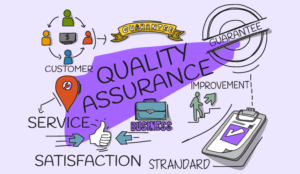Playvox encourage you to rethink your quality assurance (QA) programme by covering these seven key roles within your QA team.
Contact centres consist of more than agents and managers. Highly effective contact centres are finely tuned teams that comprise networks of managers, team leaders, and quality analysts.
Each one of these has tasks and roles to oversee their teams of agents manning the quality assurance process.
The head of the QA department is an example of many roles and clearly the top of the line in a contact centre. The Head of QA typically commands a team ranging from a few agents and managers to teams with hundreds of people.
Responsibilities include everything from leadership to bringing out the best in all team members to managing continuous training for each team member.
With 15-20 responsibilities – or more – the head of QA may delegate some of those duties to managers, team leaders, analysts and occasionally agents, depending on team size.
What if your business, as anyone would hope, begins to grow and it becomes necessary to add more people? Now there’s added responsibility for everyone to adapt.
In the contact centre business, if you don’t have a system to help and keep track of the growing list of duties, quality assurance will start to lag and that will start from the entry-level agents and work its way upward.
That’s why it’s vital for managers to assign roles and responsibilities to the entire team to areas for quality assurance, learning, performance, team communication and other essential business areas.
It’s all in an effort to boost the QA process. A fully developed roles management definition should replicate most of those roles in the tools used to manage contact centre organizations by granting or denying permissions according to the customers’ needs and the performance of every role.
This can be especially useful if your business supports work-from-home positions.
Based on work with hundreds of contact centre managers, supervisors and agents across the customer service industry, here is a breakdown of key roles used in QA practices and what they do:
- Analyst Team Leader: In charge of training analysts to be as consistent as possible in the QA process. This person conducts calibrations, making sure there is no bias between analysts and agents.
- Agent Analysts: Trust is something you earn and there are some companies who praise their agents’ performance by making them part of the QA process. This fosters team spirit and encourages employee growth within the company.
- Motivator: Agents frequently lack motivation in the contact centre industry and that’s why there is a specific role to motivate teams. This person, in charge of the rewards and recognition systems, recognizes top performers, engages with people, takes care of their mental health and creates healthy competition among agents.
- Arbitrator: Having thousands of agents disagreeing with QA analysts’ scores can be challenging. However, as their voice is very important, dedicating a role to resolving disputes is key. This role won’t conduct evaluations but checks where agents thought they were right about how the QA analysts scored them.
- Trainer: In charge of the learning management system, this person manages the knowledge base and creates courses to make sure their agents, analysts, team leaders – or even anyone within the company – is up to date with best practices and helps boost skills development.
- Senior Agent: This person is an experienced agent, a top-performer and mentors new agents. This person can also help in the onboarding process and to create learning courses.
- First entry-level agent: This is an agent at the beginning of their career or who is inexperienced in their role. This person will need to be trained in all aspects of the business and will need other new agents as peers for support and motivation.
Managing all of these roles across multiple apps, let alone trying to integrate a collection of third-party apps focused on improving agent performance into a single platform, can be difficult, if not impossible.
A robust platform like the Playvox Agent Optimization Suite makes it easy to customize roles according to specific needs and create a seamless customer service experience to reduce costs and achieve the desired business results.
To find out more visit: https://www.playvox.com
Author: Robyn Coppell
Published On: 28th Oct 2020 - Last modified: 21st Aug 2023
Read more about - Guest Blogs, Playvox















